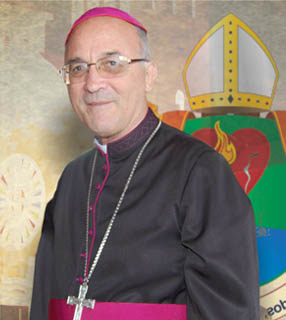André Alves
from the newsroom.

Bishop Redovino Rizzardo
But what in fact is religious liberty? When it begins and when does the freedom of a person to express as he wants his relationship with his belief? For the bishop of the Diocese of Dourados in the state of Mato Grosso do Sul and is a member of the Brazilian Bishops Commission for Ecumenism, Bishop Redovino Rizzardo, this liberty goes beyond the free exercise of religion that each person makes. It is tied to the seeking for the truth announced by Jesus.
“Religious liberty is something quite beautiful and deep of what to think: each one follows what he wants and ended. Religious liberty is to have a disposition to live his faith well. At the same time there exists that obligation in the conscience of each one of seeking the truth, of what God asks of me.” says the bishop.
Bishop Redovino believes that this question is not limited in believing, or not, that all religions are good and or true. But rather for him, the Christian has the duty of remaining faithful to the Gospel without allowing himself to detoured from what Christ taught. Religious liberty, in the opinion of the Bishop, is offering a formation to the Christians that bring them to encounter the beauty and the light of truth that is in the Word of God, in prayer and in charity.
Religious Differences
Religious liberty and the aspect of difference are interlinked and the latter can cause certain insecurity and some questioning with relations to the opinions of various Churches. Bishop Redovino stresses that in this point one can encounter the difficulty of dialog, of a correct relationship among people and even among religions.
Despite this, the bishop affirms that the differences are not negative, as generally they are classified. They can serve from support for what the Christians seek, an identity of faith more accented, sight that is necessary to have a solid faith for, then, dialoging with persons of other denominations.
“The diversity obligates to us a Christian identity well accented and deep, because the more I feel secure in my faith, the more I am capable of having that interior liberty in my relationship with whatever person. When I feel weak in faith, I am afraid of the other beliefs, other religions, they may detour my own security. The difference of religion should invite us to be more mature in faith!” he explained.
According to Bishop Redovino, differences that exist, the differences cannot be barriers. “As Pope John XXIII said, there are many more elements that unite us than that separate us. One characteristic of the adult and true Christian is ecumenism. The defense of the authenticity of the family and for the preservation of life are fundamental points where the Christians would be able and should unite forces.
For the bishop, much more than the discussion of religious dogmas and theological questions, the first stop is to give and join hearts, the stength to lives, walking together going to encounter the needs of a population. “Working together, living charity, also the faith is going to be purified,” he affirmed.
Charity is the best way to life the same faith, Bishop Redovino said. “I find that one of the roads to ecumenism is to join forces; it is for us to work together, going to encounter so many necessities of brothers and sisters that do not ask if we are Catholic or not.”
Sunday, May 12 the Week of Prayer for the Unity of Christians began in the Southern Hemisphere. They days of prayer and reflection continue until the 19th of May, the Solemnity of Pentecost.
translated from Portuguese

